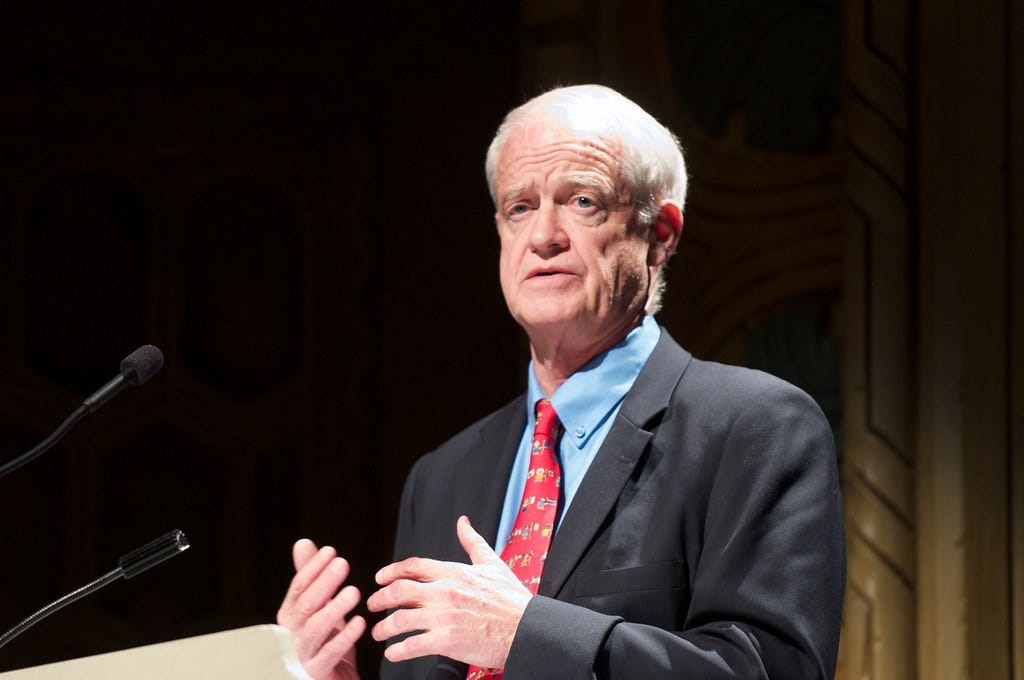Kate Brown's no-good, very-bad week
Plus: a wild interview with Peter Courtney, Ted Wheeler's "Seinfeld" recall, 2022 election heats up, and emissaries from Biden World come to Oregon.
The Oregon Way and The Oregon Bridge are partnering to provide a new service: a weekly newsletter with the most important news and analysis in Oregon politics, government, campaigns, and elections.
Stay tuned for an official launch, but until then, here’s our second installment of what you need to know:
1. Kate Brown’s no-good, very-bad week

It’s been a rough week for Governor Kate Brown—angry allies, brutal headlines, and negative research findings.
It’s getting hot in here: First, a scorching article from The Oregonian’s Hillary Borrud about how Brown spent her day during the deadly heatwave, including this line:
“The governor’s decision to stick with a scheduled June 28 strategic planning meeting with her top staffers in the state’s idyllic wine country as Oregonians confronted deadly temperatures that killed more than 100 underscores the apparent failure of the state’s top elected leader to understand — and communicate to the public — the gravity of the heat emergency.”
Thanks, but no thanks: Multiple outlets picked up the University of Oregon’s Institute for Policy Research and Engagement nearly explicit suggestion that the Governor step back from promoting vaccines. Here’s the headline to another Borrud article (this time with Fedor Zarkhin):
“Researchers urge Gov. Kate Brown to stop promoting vaccines, saying she is the ‘least trusted’ messenger for hesitant Oregonians’”
Wake up call?: Finally, Brown is being hammered by youth climate activists, according to Connor Radnovich’s reporting in the Statesman Journal. The students are using an aggressive approach to try to get their way, with one organizer saying: “She made a lot of promises when she got re-elected … and she hasn’t really followed through with any of those promises … I hope this acts as sort of a wake-up call for her."
Here are the actions the young Oregonians are urging, (most of which she is almost surely not going to take):
Veto House Bill 3055, this year's omnibus transportation bill for the Oregon Department of Transportation (ODOT). The organization calls it a "blank check" to allow ODOT to expand highways.
Place a moratorium on freeway expansions within Portland metro's Urban Growth Boundary.
Stop post-wildfire logging by ODOT.
Appoint a youth climate activist to the Oregon Transportation Commission.
Meet with Sunrise PDX and other youth climate advocates about their concerns.
Context matters: No governor expects to be leading through a seemingly-endless period of whiplash between crises. From the pandemic, to wildfires, to ice storms, to heat waves, and now back to wildfires. Regardless of your feelings regarding the Governor’s performance, you have to acknowledge she’s been dealt one of the most challenging hands in modern Oregon history.
2. Portland’s “Seinfeld” recall — a recall about nothing (and everything)

A lobbyist once told me that being Portland mayor is “the hardest job in Oregon.” His argument was that the city is inching toward “ungovernable” as polarization has hardened people and coalitions into their own respective camps — and as public policy problems have swelled beyond what local government alone can address (housing, homelessness, addiction, transportation, etc.).
Mayor Ted Wheeler, who once said he couldn’t wait for his term to be over (then ran for another term), probably agrees with that take. And now a group of left-wing activists are seeking to remove him from office by gathering 48,000 signatures, enough to trigger a recall election.
What is this all about? Depends on who you ask. Oregon elected officials get a six-month grace period before they can be recalled. Total Recall PDX, the group behind the recall, started organizing essentially the moment he won re-election (with 46% of the vote). In other words, he had not done anything yet — at least not in his current term — to trigger the effort.
The Total Recall PDX’s about page, which does not mention Ted Wheeler by name, vaguely accuses him (and/or others?) of: “malfeasance, wrongdoing, abuse of power, violating the will of the voters, and lying to get elected.”
The intersection of satire, reality, and dirty tricks: Zane Sparling of the Portland Tribune reports about a mysterious flyer (titled “Anarchy as Order”) that Total Recall PDX says isn’t their’s, yet offers some comical points. It might be satire, perhaps a coy attempt to discredit the recall — but no one seems to know for sure.
"Abolish PPB…Replace with political community defense groups managed by Sarah Iannarone”
Note: Wheeler has defeated Iannarone in the last two mayoral elections.
“Label moderate or liberal opposition as fascist or racist”
“Attend a protest in black bloc. Chant away being a citizen and become a subject. Be water.”
Our friends at the Oregon Values and Belief Center have some excellent data on how Oregonians view recall elections. They have some good news for Wheeler: in the tri-county area (which includes Portland), a plurality of 46% of voters say policy disagreements alone should be insufficient to recall an elected official. 38% said policy disagreements are sufficient, and 15% don’t know.
3. Peter Courtney on Oregon: “It’s not what it was.”

KGW’s Dan Haggerty had a wild interview with Senate President Peter Courtney. Courtney looked and sounded exhausted. As usual, he was unscripted, honest, quotable, and unhappy (and yes, wearing a lanyard).
To summarize the wide-ranging, one-hour interview, Courtney is pessimistic (though he prefers the term “realistic”). Haggerty’s surprise in the tone and content of Courtney’s response is more indicative of his lack of experience with Courtney than any change in demeanor from the Senate President. This is quintessential Peter Courtney. Here are some highlights:
On whether or not his son should move to Oregon, Courtney said, thinking of his grandchildren: “I told him: don’t leave Montana.” Why? “People pull for each other more there.”
On Oregon’s greatness as a state: “Oregon’s not what it was.”
On working together: “The value of compromise is no longer considered valuable.”
On the Democratic Party: “The party has itself become divided. We are now experiencing the same thing in our party that the Republicans did some time ago on the Tea Party situation.”
On redistricting, he second-guessed his decision to put more Democrats than Republicans on the Senate Redistricting Committee (a standard practice in the legislature for the caucus with the majority of seats), and seemed to blame Senate Democrats for this decision, claiming he thought they might shut down and allow Secretary of State Shemia Fagan to draw the maps.
He seemed to downplay legislative investments in homelessness and education, questioning whether they will make a difference given the scope of the challenges. He said the state of journalism and the legislative process is “sad.”
On the COVID-19 pandemic: “I don’t want to be a naysayer…I just don’t jump up and down for thinking that we’re okay. I just don’t. I don’t think we know what hit us yet.”
Parting shot: “Loyalty no longer exists. You have to redefine the word ‘loyalty.’ Loyalty is only in the moment, it isn’t long term…Ambition has become the dominant force. I can handle a person who is driven. I can’t handle a person who is ambitious.” According to Courtney, this applies to TV anchors, coaches, athletes, entertainers, and presumably politicians.
Any guesses on who he is subtweeting?
4. Campaign season heating up: Oregon Senate Democrats’ campaign committee hiring an Executive Director

The Senate Democratic Leadership Fund (SDLF), the campaign arm of the Oregon Senate Democrats, is hiring an Executive Director for the 2022 cycle. From the posting on Mac’s List: “The Executive Director will work directly with senior leadership, the Caucus Administrator, and the Majority Leader.” The salary will be $6,500-$8,000 per month.
This will be Senator Rob Wagner’s first full cycle at majority leader, but on ORESTAR, two candidates are listed as controlling the PAC. The other is Senate President Peter Courtney. Who knows what role he will play in targeting and financial decisions in a cycle that could reshape the Oregon Senate?
Incumbent Protection: The number one goal for the new SDLF E.D. will be to keep control of purple-ish districts represented by Courtney, Senator Deb Patterson (yes, again — 2020 was a special election to fill the seat vacated by the passing of Senator Jackie Winters), Senator Jeff Golden, Senator Chuck Riley and Senator Betsy Johnson.
Seeing Red: The Leadership Fund (the GOP equivalent of SDLF) will try to protect the seats held by Senator Kim Thatcher, Senator Bill Kennemer, and Senator Chuck Thomsen.
TBD: Not only do we not know what the newly-redistricted maps will look like, we still don’t know which incumbents will be running again. Expect a rapid acceleration of campaign announcements in late summer, early fall.
Checkpoint: The Senate GOP Caucus has $52,364 on hand. Republican Leader Senator Fred Girod has $220,105. The Senate Dems have $22,439. Wagner has $167,261, and Courtney has $245,436.
Our take: These numbers don’t mean much, yet. Literally millions of dollars will be raised and spent this cycle, and without contribution limits, a single check can level the financial playing field at any moment.
5. The Biden Administration comes to Oregon

Thanks to Congressman Peter DeFazio (D-Lane County) and Congresswoman Suzanne Bonamici (D-Washington County), Oregon had a couple of high-profile dignitaries visit last week, emissaries from Biden World in D.C.
In Lane County, DeFazio welcomed Secretary of Transportation Pete Buttigieg (formerly Mayor Pete) to tout the Administration’s infrastructure plan (and drive an electric bus). Buttigieg did his homework and knew his audience. Here’s a Buttigieg quote on the Biden plan captured by Rachael McDonald of KLCC: “It’s, of course, going to make the air cleaner here in Lane County. It’s going to reduce carbon emissions around the world. And it’s coming at a moment when Oregon, unfortunately, like so many other places in the world, has reminded us of what’s at stake in the climate crisis.”
After nearly 35 years in Congress, DeFazio is at the peak of his power. He chairs the House Transportation Committee, a very powerful post, at a time when Democrats control the White House and both chambers of Congress. His fingerprints will be all over the infrastructure deal that is likely to pass in the coming months.
DeFazio may be one of the top-targeted congressional races in the country next year, as last year’s challenger Alek Skarlatos has already announced intentions to run (and just announced that he has over $215,000 in cash on hand). Skarlatos came closer than any other challenger to beating DeFazio in his entire career.
In Washington County, Bonamici welcomed Secretary of Education Dr. Miguel Cardona to tour Witch Hazel Elementary in Hillsboro and Southridge High School in Beaverton. The topics of the visits were summer bilingual enrichment programs and free community college.
Bonamici is approaching her ten-year anniversary as a member of Congress, and while she is unlikely to face a competitive re-election, her influence seems to be rising, too. She chairs a subcommittee of the House Committee on Education and Labor (when the Dems were in the minority, she was the Vice Ranking Member; the Vice-Chair is now Congressman Jamaal Bowman of New York).
The Oregon Way: Oregon has a rich history of punching above its weight class in Congress. It’s nice to see national figures swing through for a visit.
6. The Urban-Rural Divide: There’s more Oregon out there

BEND: Depending on who you ask, Texas Democrats’ walkout is either totally different or exactly the same as the Oregon Republicans’ walkout. Last week, The Bend Bulletin editorial board asked a question on the minds of many Oregonians: how does the Texas walkout relate to those of Republicans in Oregon in the face of climate change legislation?
An excerpt: “We could bemoan politicians for their costly experimentation with political brinkmanship. And we aren’t claiming there is equivalency between the Oregon climate change bill and the Texas voting bill. But if you were a legislator, couldn’t you conceive a situation where you would walkout to at least delay a bill?”
A new political action committee called “No More Costly Walkouts” has been formed by progressive organizations, including labor groups, pro-choice groups, and environmental groups, to pursue ballot measure “fixes”.
VALE: Portlanders aren’t the only folks working on a recall effort. The Baker City Herald outlined the early efforts to recall State Senator Lynn Findley (R-Vale). The “Findley Failed” PAC was formed in response to Sen. Findley showing up to vote “no” on a gun control measure:
“Findley was among six Republican senators who have been sharply criticized by some conservative activists for voting against Senate Bill 554, a gun control bill, rather than walking out to prevent the legislation from moving forward.”
MEDFORD: As cities around Oregon struggle to increase the stock of affordable housing and assist homeless individuals, the City of Medford is moving ahead with a new navigation center. The Ashland Tidings covered the details of the proposed center in a recent article. This may be a project for Portland and others to keep an eye on:
“The city received a $2.5 million state grant in April that provides much of the money to get the project rolling. The center wouldn’t be operated by the city but by an organization that has at least two years experience with a shelter and have the ability to get it operational by July 1, 2022.”
ALBANY: The thesis of The Oregon Bridge is that national news, people, and trends have an increasingly outsized impact at the local level. Here is Exhibit A: In a dramatic public meeting, the newly-elected majority of the Greater Albany Public Schools Board of Directors fired Superintendent Melissa Goff less than two weeks into their terms. The no-cause firing comes with a severance that could cost upward of $200,000. There was no public comment at the meeting, but audience members (on both sides) yelled throughout. The board members did not give a reason for the termination, citing employee confidentiality, but there are suspicions that the district’s pandemic response and, perhaps more importantly, its focus on equity, diversity, and inclusion played a role. Goff, who was asked not to attend the meeting, said she was “stunned.”
7. What we’re reading: Other stories on our radar
Big, if true: Pulitzer Prize-winning New York Times columnist Nick Kristof is considering a run for Oregon Governor
Operation Hall Pass Update: The Oregon Capitol is back open
On the national stage for the wrong reasons: Blazers’ Chauncey Billups investigation was a disaster (USA Today picks up on the original OPB article)
The frosh-es are the bosses: Freshmen legislators get a glowing profile in OPB
The bird is the word: Marbled murrelets are not spotted owls (yet)
The not-so-invisible Facebook primary: If Facebook likes are any indication, Attorney General Ellen Rosenblum is definitely running for Governor
Shameless plug: The Oregon Bridge got an exclusive interview with former Happy Valley Mayor Lori Chavez-DeRemer on her announcement that she’s running against Congressman Kurt Schrader
What did we miss?
Tips? Feedback? Ideas? Corrections? We want to hear from you! Help us keep all Oregonians up to date on the important stories on politics, government, campaigns, and elections from around the state. Email benjaminwbowman@gmail.com.
Are you a cabinet secretary? An endangered waterfowl? Let us know if you’d like to be featured on The Oregon Bridge, or if you’d like to write on The Oregon Way.



